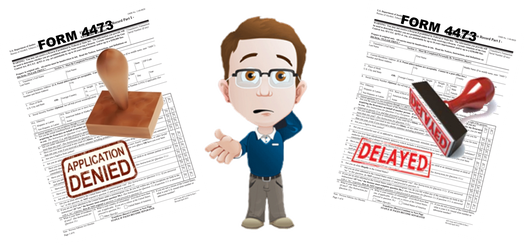When a person seeks to purchase a firearm from a federally-licensed firearms dealer (FFL), the FFL is required by federal law to obtain government approval for the transaction prior to transferring possession of the firearm to the buyer.
The federally-mandated government approval process begins with the buyer completing a “Firearms Transaction Record,” also known as an “ATF Form 4473,” or simply a “4473.” After the buyer completes the 4473, the FFL verifies the buyer’s eligibility to receive the purchased firearm.
In Texas, this verification may be accomplished in one of two ways: If the buyer possesses a valid License to Carry (LTC) a Handgun, the FFL need do nothing more than photocopy the buyer’s LTC. If the buyer does not possess a valid LTC, the FFL initiates a telephone inquiry with law enforcement. Law enforcement officials then attempt to verify the buyer’s eligibility to receive the purchased firearm through database which is setup specifically for this purpose.
The vast majority of 4473s are approved immediately and the FFL is then authorized to transfer possession of the purchased firearm to the buyer.
Of those 4473s which are not approved immediately, some are denied immediately and others are neither immediately approved or immediately denied. Federal law provides that when a 4473 is delayed, that is, not immediately approved or immediately denied, a FFL may, but is not required to, transfer the purchased firearm to the buyer if the FFL does not receive a denial notification within 72 hours.
There are many possible reasons why a 4473 might erroneously be denied or not immediately approved. One common reason is that incorrect information was reported to law enforcement and has thus become included in the purchaser’s criminal history record.
The solution to this type of problem is to ascertain what specific entry (or entries) in a person’s criminal history record are causing the 4473 delay or denial; determine whether that entry (or entries) is erroneous; and if an entry (or entries) is erroneous, take the appropriate steps to have the erroneous entry (or entries) corrected.
The federally-mandated government approval process begins with the buyer completing a “Firearms Transaction Record,” also known as an “ATF Form 4473,” or simply a “4473.” After the buyer completes the 4473, the FFL verifies the buyer’s eligibility to receive the purchased firearm.
In Texas, this verification may be accomplished in one of two ways: If the buyer possesses a valid License to Carry (LTC) a Handgun, the FFL need do nothing more than photocopy the buyer’s LTC. If the buyer does not possess a valid LTC, the FFL initiates a telephone inquiry with law enforcement. Law enforcement officials then attempt to verify the buyer’s eligibility to receive the purchased firearm through database which is setup specifically for this purpose.
The vast majority of 4473s are approved immediately and the FFL is then authorized to transfer possession of the purchased firearm to the buyer.
Of those 4473s which are not approved immediately, some are denied immediately and others are neither immediately approved or immediately denied. Federal law provides that when a 4473 is delayed, that is, not immediately approved or immediately denied, a FFL may, but is not required to, transfer the purchased firearm to the buyer if the FFL does not receive a denial notification within 72 hours.
There are many possible reasons why a 4473 might erroneously be denied or not immediately approved. One common reason is that incorrect information was reported to law enforcement and has thus become included in the purchaser’s criminal history record.
The solution to this type of problem is to ascertain what specific entry (or entries) in a person’s criminal history record are causing the 4473 delay or denial; determine whether that entry (or entries) is erroneous; and if an entry (or entries) is erroneous, take the appropriate steps to have the erroneous entry (or entries) corrected.
Lapin Law Group is Your Texas Firearms Law Firm Who Supports the Second Amendment and All That it Stands For
Do you need help with a firearms law-related issue?
Contact us today by calling (877) 570-2200, or CLICK HERE to send us an email.
Contact us today by calling (877) 570-2200, or CLICK HERE to send us an email.
Disclaimer
The information contained in this publication is provided by Lapin Law Group, P.C., for informational purposes only and shall not constitute legal advice or serve as the basis for the creation of an attorney-client relationship. The laws and interpretation of laws discussed herein may not accurately reflect the law in the reader’s jurisdiction. Do not rely on the information contained in this publication for any purpose. If you have a specific legal question, please consult with an attorney in your jurisdiction who is competent to assist you.
Lapin Law Group, with its principal office in the Dallas-Forth Worth Metroplex, serves all 254 Texas counties.
Lapin Law Group, with its principal office in the Dallas-Forth Worth Metroplex, serves all 254 Texas counties.


